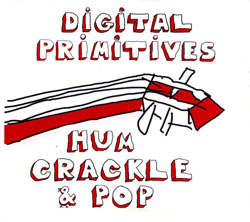
"Digital Primitives" is an intriguingly direct name for the trio of Cooper-Moore, Assif Tsahar and Chad Taylor, so simple it could even be missed. It suggests, at first, a sort of anachronism, a 21st Century man, which isn't altogether off the mark, but it runs deeper than that. They are also an acoustic band who create an expansive, contemporary sound.
The driving force of the band is conceptualist and instrument-builder Cooper-Moore, who is heard here on vocals and variety of his handmade string instruments (a wooden-bodied banjo, the bass-like didley-bow, the twanger and mouth-bow) that underscore his Appalachian roots. In other contexts, his instruments and blues hollers can evoke something "primitive" (even if one might hesitate to use the word), but here they are treated to such a huge reproduction in recording (the "digital") that they sound very contemporary, which in an odd way starts to then register as "electronic."
Taylor here almost always delivers interesting and measured rhythms, quick and unusual counts that in their digitally primitive way sound programmed but of course aren't. Tsahar is the odd element out here. Cooper-Moore could no doubt spend days with Taylor's drums, and it is Tsahar's saxophone that has to find it's way. It's not always a natural fit, it's a honky-tonk instrument, not a front porch one, which gives the music an interesting tension. Tsahar can scream free jazz, but here is forced to find a bluesier tack, laying back on the vocal tracks and taking easy leads elsewhere.
While the playing and composing is strong throughout, it's the production (surprisingly uncredited, most likely by the band, with mixing by Tsahar and Tamir Muskat) that makes the record. The sound is huge. On "The People," a Bill of Rights rant reminiscent of the Last Poets, sparingly heavy vocal multi-tracking and delays create an urban sense that could be tied to the 1970s or the current day. They touch other stones by covering "Somewhere Over the Rainbow" and dedicating a piece to Chicago saxophonist Fred Anderson. In a surprising way for a working band like this trio, there's a polyglot feel similar to a lot of contemporary "world music" productions: it's city and it's rural, it's traditional and it's modern, it's electric and authentic. However where that approach can also boil down to blandness, in these hands the elements remain distinct.
Comments and Feedback:



More Recent Reviews, Articles, and Interviews @ The Squid's Ear...


|

